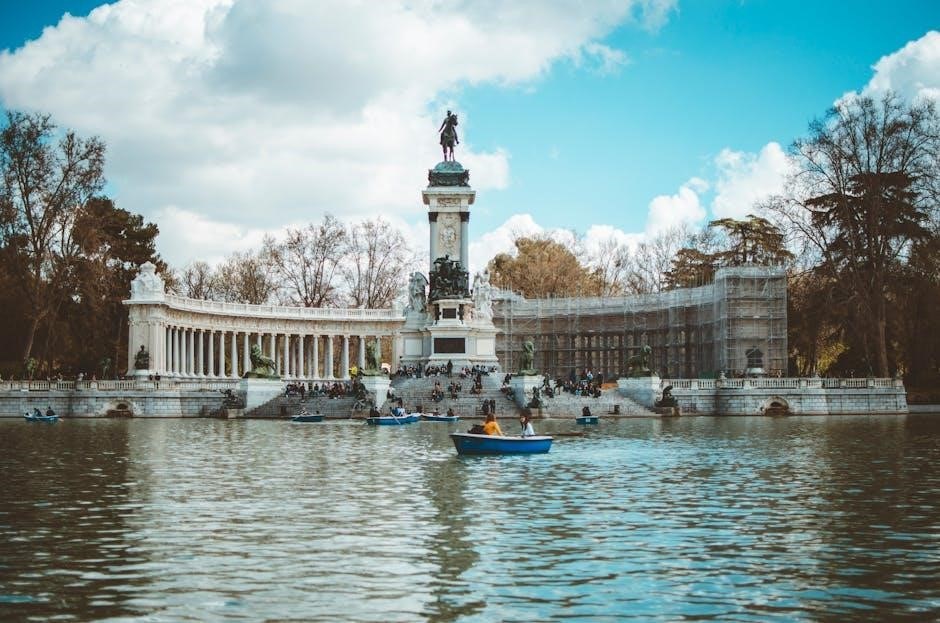Historical Context of Spain’s Royal Influence
Spain’s monarchy has historically guided the nation’s political and cultural affairs, shaping its identity through influential dynasties like the Habsburgs and Bourbons, and adapting to modern democratic transitions.
1.1 The Habsburg Dynasty’s Impact
The Habsburg Dynasty played a pivotal role in shaping Spain’s history, particularly during the 16th and 17th centuries. Under rulers like Charles I and Philip II, the monarchy expanded its territories, establishing a vast empire that included the Americas, parts of Europe, and Asia. The Habsburgs were instrumental in unifying Spain politically and culturally, fostering a strong Catholic identity. They also promoted the arts, with royal patronage contributing to the flourishing of Spanish culture during the Golden Age. However, their ambitious foreign policies and centralized governance led to economic strain and regional tensions. Despite this, the Habsburgs laid the foundation for Spain’s rise as a global power, influencing its political and cultural legacy for centuries.
1.2 The Bourbon Dynasty’s Contributions
The Bourbon Dynasty’s arrival in Spain in the 18th century marked a significant shift towards modernization and reform. Under Philip V, the first Bourbon king, Spain adopted progressive policies inspired by Enlightenment ideals, leading to administrative and economic reforms. The Bourbons strengthened the central government, reorganized the military, and promoted education and infrastructure. They also revived Spain’s cultural prominence, supporting artists and architects. Despite facing challenges like the Napoleonic invasion, the Bourbons’ efforts laid the groundwork for Spain’s transition into a modern nation. Their reign emphasized stability and cultural renewal, setting the stage for Spain’s integration into European affairs and its enduring royal legacy.
Transition to Democracy
Spain’s transition to democracy, guided by King Juan Carlos I, marked a pivotal shift from dictatorship to constitutional monarchy, ensuring political stability and modern governance post-Franco era.
2.1 King Juan Carlos I’s Role
King Juan Carlos I played a pivotal role in Spain’s transition to democracy, steering the nation from dictatorship to constitutional monarchy. His leadership during the post-Franco era was instrumental in fostering political reform and stability. By supporting democratic institutions and opposing authoritarian remnants, he ensured a smooth transition. His commitment to democracy was evident in his actions, such as endorsing free elections and a new constitution. The king’s role in unifying the country and promoting national reconciliation laid the foundation for modern Spain. His abdication in 2014 marked the end of an era, but his legacy remains central to Spain’s democratic evolution and its integration into the global community.
2.2 The 1978 Constitution
The 1978 Constitution marked a cornerstone in Spain’s transition to democracy, establishing the country as a parliamentary monarchy. It defined the monarch’s role as ceremonial and symbolic, ensuring the separation of powers and the recognition of fundamental rights. This document laid the groundwork for modern Spain, fostering political stability and social cohesion. The Constitution also emphasized regional autonomy, creating a decentralized state that respected cultural diversity. Its adoption was a pivotal moment, guiding Spain toward integration into the European Community and solidifying democratic principles. The 1978 Constitution remains a cornerstone of Spanish governance, ensuring the rule of law and the protection of individual freedoms for future generations.

Cultural Affairs and Patronage
Spain’s royals have long supported the arts, education, and cultural preservation, fostering national identity and intellectual growth through royal patronage and initiatives.
3.1 Royal Patronage of the Arts
Spain’s royals have historically been pivotal in fostering artistic excellence, supporting renowned artists like Goya and Velázquez. Their patronage extended to architecture, literature, and music, enriching Spain’s cultural heritage. The monarchy’s sponsorship of masterpieces and institutions, such as the Prado Museum, highlights their commitment to preserving and promoting artistic legacy. This enduring support has cemented the royal family’s role as custodians of Spain’s rich cultural identity, ensuring the arts remain a cornerstone of national pride and global appreciation.
The monarchy’s influence continues to nurture contemporary artistic endeavors, maintaining a vibrant connection between tradition and modern creativity.
3.2 Educational Initiatives and Preservation
Spain’s royal family has played a significant role in promoting education and preserving the nation’s cultural heritage. Through their support of esteemed institutions like the Royal Academy of Arts and the Royal Library, they have fostered intellectual growth and safeguarded historical treasures. The monarchy has also championed educational initiatives, such as scholarships and cultural exchange programs, to nurture future generations. Their commitment to preserving Spain’s rich history is evident in the restoration of historical sites and the promotion of educational programs that highlight the country’s legacy.
These efforts reflect the royals’ dedication to ensuring Spain’s educational and cultural heritage endures for generations to come.

Economic Development Strategies
Spain’s monarchy has supported initiatives to boost industries, attract foreign investment, and promote tourism, fostering economic stability and growth through strategic investments and international trade collaborations.
4.1 Strategic Investments and Initiatives
Spain’s royal family has historically played a pivotal role in guiding strategic investments and initiatives that foster economic growth. By supporting key sectors such as infrastructure, renewable energy, and technology, the monarchy has encouraged innovation and modernization. Royal patronage has also promoted international collaborations, attracting foreign investment and enhancing Spain’s global economic presence. Additionally, the monarchy has advocated for sustainable development projects, aligning with global trends to ensure long-term prosperity. These efforts have contributed to the diversification of Spain’s economy, creating opportunities for small and medium enterprises and fostering a culture of entrepreneurship. Through these initiatives, the Spanish royals have demonstrated a commitment to advancing the nation’s economic interests while addressing contemporary challenges.
4.2 International Trade Relations
Spain’s royal family has historically played a significant role in fostering international trade relations, enhancing the nation’s global economic presence. Through state visits and diplomatic engagements, the monarchy has strengthened ties with foreign nations, promoting Spanish goods and services. The royals have supported bilateral trade agreements, particularly within the European Union and with Latin American countries, leveraging historical and cultural connections. By championing Spanish industries at international forums, the monarchy has facilitated the expansion of exports and attracted foreign investment. These efforts have not only boosted Spain’s trade volumes but also reinforced its position as a key player in global commerce, ensuring economic stability and growth through strategic partnerships.

Social Welfare and Humanitarian Efforts
Spain’s royals have guided the nation in social welfare and humanitarian efforts, supporting charitable organizations, education, and healthcare initiatives to aid those in need.
5.1 Charity Work and Philanthropy
Spain’s royals have long been devoted to charitable causes, guiding humanitarian efforts through active involvement in philanthropic organizations. Queen Sofía, for instance, has been instrumental in supporting vulnerable groups, including the elderly and those with disabilities. Her Majesty has championed numerous initiatives aimed at improving quality of life and fostering social inclusion. Similarly, King Felipe VI and Queen Letizia have prioritized education, children’s welfare, and health-related charities. The royal family often collaborates with entities like the Red Cross and UNICEF, demonstrating a commitment to alleviating suffering and promoting equity. Their philanthropic work not only addresses immediate needs but also inspires broader societal engagement, reflecting a deep-rooted dedication to the well-being of all citizens. This leadership in charity underscores the monarchy’s enduring role in fostering compassion and unity across Spain.
5.2 Social Initiatives and Community Support
Spain’s royals have consistently supported social initiatives, guiding community development through active participation in programs that address societal challenges. Queen Letizia has been a strong advocate for social inclusion, particularly in education and youth development, often visiting schools and promoting equal opportunities. King Felipe VI has focused on economic revitalization in rural areas, supporting local businesses and job creation. The royal family frequently collaborates with NGOs and public institutions to amplify the reach of these initiatives. Their efforts emphasize reducing social disparities and fostering unity across diverse communities. By engaging directly with citizens and organizations, the monarchy demonstrates its commitment to strengthening societal bonds and advancing collective well-being, reflecting a legacy of dedication to Spain’s social fabric.

International Diplomacy and Relations
Spain’s royals have historically guided international diplomacy, fostering alliances and cultural exchanges. The Habsburgs expanded global influence, while modern monarchs like King Juan Carlos I strengthened democratic ties abroad.
6.1 State Visits and Diplomatic Engagements
Spain’s royals have historically played a pivotal role in guiding state visits and diplomatic engagements, fostering global alliances and cultural exchanges. The Habsburgs and Bourbons laid the foundation for Spain’s international influence through strategic marriages and treaties. In modern times, King Juan Carlos I and Queen Sofía were instrumental in strengthening democratic relations post-transition, while King Felipe VI continues to enhance Spain’s global image through state visits to Latin America and Europe. These diplomatic efforts have solidified Spain’s position as a key player in international affairs, promoting cultural understanding and economic partnerships. The monarchy’s ability to navigate complex geopolitical landscapes has been crucial in maintaining Spain’s diplomatic relevance on the world stage.
6.2 Role in European Union Affairs
Spain’s royals have played a significant role in guiding the nation’s integration and involvement in European Union affairs. The monarchy’s historical influence facilitated Spain’s transition from isolation to becoming a key EU member. King Juan Carlos I’s diplomatic efforts were instrumental in Spain’s accession to the EU in 1986, fostering strong ties with European leaders. The royal family continues to support EU initiatives, attending high-level meetings and promoting unity. Their involvement in state visits and cultural exchanges has strengthened Spain’s position within the EU, emphasizing shared values and cooperation; The monarchy’s commitment to European integration reflects its enduring role in shaping Spain’s international identity and fostering a united Europe.
Modernization of the Monarchy
Spain’s monarchy has modernized by embracing transparency, public engagement, and digital communication, ensuring relevance in contemporary society while maintaining traditional values and preparing for future roles.
7.1 Public Image and Media Engagement
The Spanish monarchy has actively shaped its public image through strategic media engagement, ensuring visibility and relevance in modern society. By appearing in public events, ceremonies, and charitable activities, the royal family maintains a connection with citizens, fostering trust and national pride. Digital platforms have become essential tools for conveying their commitments, with social media being used to share updates on royal duties, engagements, and initiatives. Televised speeches and interviews further enhance transparency, allowing the monarchy to communicate directly with the public. This modern approach to media engagement not only strengthens the institution’s public image but also aligns it with contemporary expectations of openness and accessibility.
7.2 Succession Planning and Future Roles
Spain’s monarchy has ensured continuity through careful succession planning, with King Felipe VI succeeding King Juan Carlos I in 2014. Princess Leonor, the heir apparent, is being prepared for her future role through education and public appearances; The monarchy adapts to societal changes, emphasizing transparency and public engagement to maintain relevance. Infanta Sofía, Leonor’s sister, also plays a part in royal duties, though her role is less prominent. The royal family’s future roles involve balancing tradition with modern expectations, ensuring the monarchy remains a unifying symbol for Spain. Succession planning reflects a commitment to stability and the evolution of the monarchy in a democratic society.
7.3 Public Engagement and Transparency
The Spanish royal family has embraced public engagement and transparency to strengthen their connection with society. King Felipe VI and Queen Letizia regularly attend cultural, social, and charitable events, showcasing their commitment to national unity. The monarchy has also adopted modern communication strategies, utilizing media to share their activities and decisions openly. This shift toward transparency aims to foster trust and understanding in a democratic society; By engaging with diverse communities and supporting social initiatives, the royals demonstrate their role as unifying figures. Their efforts to adapt to contemporary expectations highlight a monarchy dedicated to maintaining relevance while respecting tradition.
